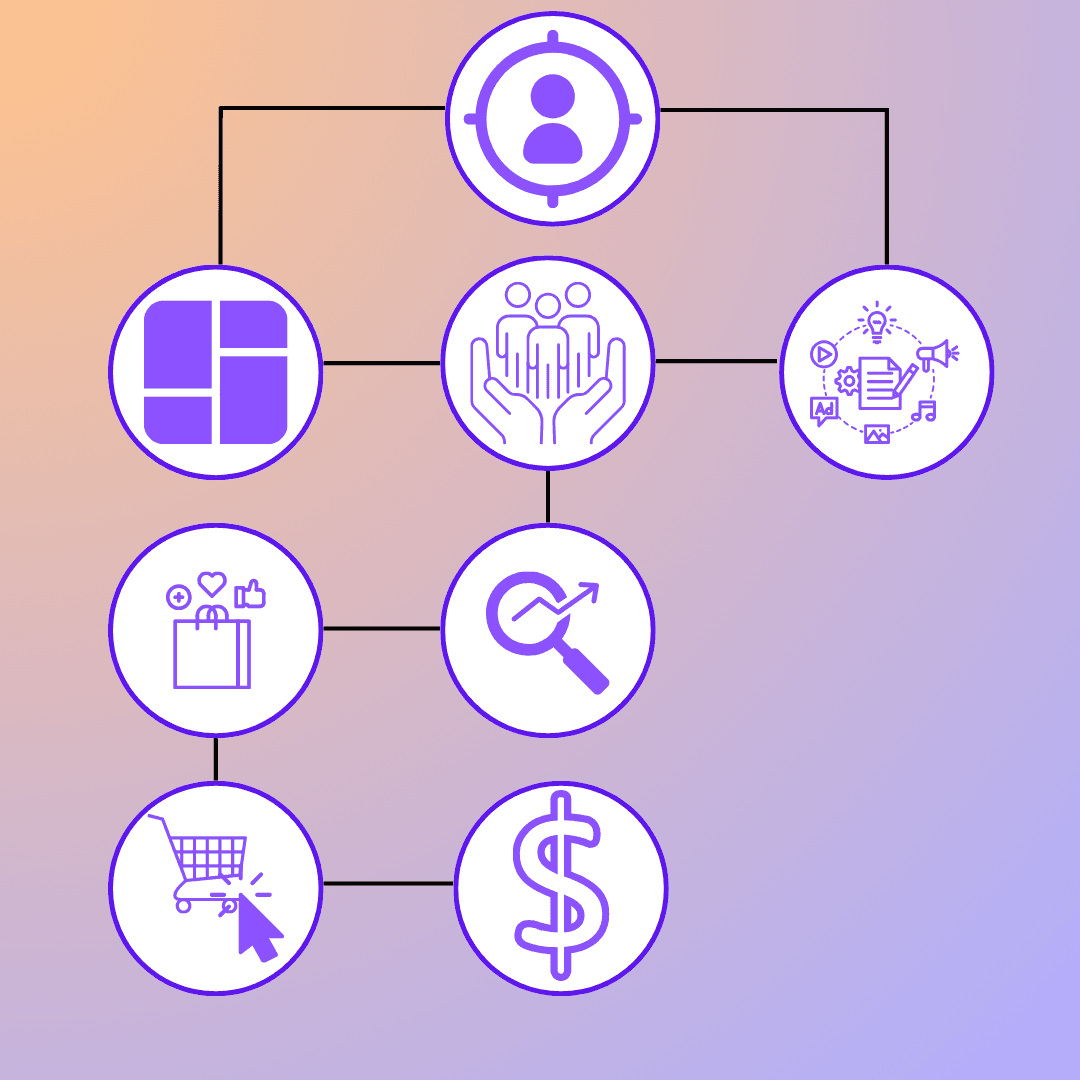DAY
8 Simple Steps to Become an Affiliate Marketer and Start Making Passive Income
Mar 23, 2024

The journey to becoming an affiliate marketer isn't a hard one, but requires careful planning and strategic decisions. Here's how you can start your affiliate journey for under $400 in 8 simple steps.
Step 1: Identify Your Niche
Budget: $0
Action: The first and arguably most crucial step is selecting a niche that resonates with your passion, expertise, or an unaddressed gap in the market. A well-chosen niche not only fuels your motivation but also positions you for success by targeting a specific audience.
Budget Use: Leverage an array of free online resources to conduct thorough niche research. Dive into forums, social media groups, and employ tools like Google Trends to get a pulse on what people are interested in, discussing, and searching for. This initial exploration requires no financial outlay, relying instead on your dedication to uncovering a niche with a healthy balance of interest and manageable competition.
Step 2: Find Affiliate Programs
Budget: $0
Action: With a niche in hand, the next step is to find affiliate programs that align with your chosen field. Focus on programs offering products or services relevant to your audience, competitive commission rates, and affiliate support.
Budget Use: This phase involves investing time to navigate through affiliate networks (like ShareASale, Commission Junction, and others) and direct affiliate programs offered by companies. Look for detailed program descriptions, payout structures, and the reputation of the companies behind these programs. Your objective is to identify partnerships that promise the best synergy with your content and audience engagement strategies.
Step 3: Set Up a Website
Budget: $100 - $120
Action: A functional, aesthetically pleasing website serves as your digital storefront. Begin by selecting a domain name that reflects your niche and brand identity. Next, choose a hosting plan that provides the reliability and support you'll need.
Budget Use: Allocate approximately $10/year for domain registration and between $90-$110/year for a hosting plan. WordPress, an open-source platform, is a popular choice for building websites thanks to its ease of use and extensive library of free themes and plugins. This step lays the foundation for your online presence, ensuring you have a platform to publish content, showcase affiliate products, and engage with your audience.
Step 4: Create Content
Budget: $0 - $280
Action: Content creation is the heart of your affiliate marketing efforts. High-quality, valuable content attracts and retains an audience. Focus on producing a mix of articles, reviews, guides, and any other content that resonates with your niche.
Budget Use: Writing content yourself is cost-effective, tapping into your knowledge and passion for the niche. However, to boost your SEO and content quality, consider investing in keyword research tools like Ubersuggest, or occasionally hiring freelance writers. While the basic plan for a tool like Ubersuggest starts at around $29/month, freelance writing rates can range from $50 to $100 per article, depending on length and complexity.
Step 5: Optimize for SEO
Budget: $0
Action: Implementing fundamental SEO practices increases your content's visibility on search engines, driving organic traffic to your site.
Budget Use: Take advantage of free resources and tools such as Google's Keyword Planner and advice from reputable SEO blogs and forums. Learning SEO and applying its principles effectively will enhance your site's search rankings and visibility without incurring additional costs. Patience and continuous learning are key, as SEO strategies evolve over time.
Step 6: Promote Your Site and Affiliate Links
Budget: $0
Action: Promotion is critical to driving traffic to your site and generating affiliate revenue. Utilize organic strategies such as engaging on social media platforms, participating in forums related to your niche, and building a community around your brand.
Budget Use: While focusing primarily on free promotional tactics, you might experiment with paid advertising on platforms like Facebook or Google. Start with targeted, low-budget campaigns to test the waters. Allocate a small portion of your budget, if available, to these experiments, carefully tracking performance to determine the ROI and adjust strategies accordingly.
Step 7: Track Your Progress
Budget: $0
Action: Regular monitoring of your website's traffic and affiliate performance is vital to understand what's working and what needs adjustment.
Budget Use: Google Analytics offers a comprehensive suite of tools to analyze website traffic, engagement metrics, and conversion rates at no cost. Use these insights to refine your content strategy, SEO practices, and promotional efforts, ensuring your affiliate marketing business remains aligned with your audience's needs and interests.
Final Advice:
Prioritize Content Quality: Even with minimal investment, high-quality, valuable content can attract a loyal audience.
Be Patient: Building a successful affiliate marketing business takes time. Focus on steady growth and reinvesting any earnings back into the business.
Learn and Adapt: Stay informed about SEO, content creation, and affiliate marketing trends. Utilize free educational resources online to keep improving your strategy.
With careful planning and strategic effort, you can start and grow an affiliate marketing business on a budget of under $400. Success will depend on your ability to create engaging content, optimize for search engines, and effectively promote your affiliate products to your audience.

Finding Your Financial Path
Apr 1, 2024
When it comes to money, we often hear about the "right" ways to save, invest, and plan for the future. But here's th...

How Running for 30 Minutes a Day Can Boost Your Financial Health
Mar 31, 2024
In today's fast-paced world, finding the balance between managing our finances and keeping ourselves physically fit ...

How Being Thankful Can Change Your Money Mindset
Mar 30, 2024
In today's fast-paced world, it's easy to always want more—more money, the latest gadgets, a bigger house. But what i...
NIGHT
8 Simple Steps to Become an Affiliate Marketer and Start Making Passive Income
Mar 23, 2024

The journey to becoming an affiliate marketer isn't a hard one, but requires careful planning and strategic decisions. Here's how you can start your affiliate journey for under $400 in 8 simple steps.
Step 1: Identify Your Niche
Budget: $0
Action: The first and arguably most crucial step is selecting a niche that resonates with your passion, expertise, or an unaddressed gap in the market. A well-chosen niche not only fuels your motivation but also positions you for success by targeting a specific audience.
Budget Use: Leverage an array of free online resources to conduct thorough niche research. Dive into forums, social media groups, and employ tools like Google Trends to get a pulse on what people are interested in, discussing, and searching for. This initial exploration requires no financial outlay, relying instead on your dedication to uncovering a niche with a healthy balance of interest and manageable competition.
Step 2: Find Affiliate Programs
Budget: $0
Action: With a niche in hand, the next step is to find affiliate programs that align with your chosen field. Focus on programs offering products or services relevant to your audience, competitive commission rates, and affiliate support.
Budget Use: This phase involves investing time to navigate through affiliate networks (like ShareASale, Commission Junction, and others) and direct affiliate programs offered by companies. Look for detailed program descriptions, payout structures, and the reputation of the companies behind these programs. Your objective is to identify partnerships that promise the best synergy with your content and audience engagement strategies.
Step 3: Set Up a Website
Budget: $100 - $120
Action: A functional, aesthetically pleasing website serves as your digital storefront. Begin by selecting a domain name that reflects your niche and brand identity. Next, choose a hosting plan that provides the reliability and support you'll need.
Budget Use: Allocate approximately $10/year for domain registration and between $90-$110/year for a hosting plan. WordPress, an open-source platform, is a popular choice for building websites thanks to its ease of use and extensive library of free themes and plugins. This step lays the foundation for your online presence, ensuring you have a platform to publish content, showcase affiliate products, and engage with your audience.
Step 4: Create Content
Budget: $0 - $280
Action: Content creation is the heart of your affiliate marketing efforts. High-quality, valuable content attracts and retains an audience. Focus on producing a mix of articles, reviews, guides, and any other content that resonates with your niche.
Budget Use: Writing content yourself is cost-effective, tapping into your knowledge and passion for the niche. However, to boost your SEO and content quality, consider investing in keyword research tools like Ubersuggest, or occasionally hiring freelance writers. While the basic plan for a tool like Ubersuggest starts at around $29/month, freelance writing rates can range from $50 to $100 per article, depending on length and complexity.
Step 5: Optimize for SEO
Budget: $0
Action: Implementing fundamental SEO practices increases your content's visibility on search engines, driving organic traffic to your site.
Budget Use: Take advantage of free resources and tools such as Google's Keyword Planner and advice from reputable SEO blogs and forums. Learning SEO and applying its principles effectively will enhance your site's search rankings and visibility without incurring additional costs. Patience and continuous learning are key, as SEO strategies evolve over time.
Step 6: Promote Your Site and Affiliate Links
Budget: $0
Action: Promotion is critical to driving traffic to your site and generating affiliate revenue. Utilize organic strategies such as engaging on social media platforms, participating in forums related to your niche, and building a community around your brand.
Budget Use: While focusing primarily on free promotional tactics, you might experiment with paid advertising on platforms like Facebook or Google. Start with targeted, low-budget campaigns to test the waters. Allocate a small portion of your budget, if available, to these experiments, carefully tracking performance to determine the ROI and adjust strategies accordingly.
Step 7: Track Your Progress
Budget: $0
Action: Regular monitoring of your website's traffic and affiliate performance is vital to understand what's working and what needs adjustment.
Budget Use: Google Analytics offers a comprehensive suite of tools to analyze website traffic, engagement metrics, and conversion rates at no cost. Use these insights to refine your content strategy, SEO practices, and promotional efforts, ensuring your affiliate marketing business remains aligned with your audience's needs and interests.
Final Advice:
Prioritize Content Quality: Even with minimal investment, high-quality, valuable content can attract a loyal audience.
Be Patient: Building a successful affiliate marketing business takes time. Focus on steady growth and reinvesting any earnings back into the business.
Learn and Adapt: Stay informed about SEO, content creation, and affiliate marketing trends. Utilize free educational resources online to keep improving your strategy.
With careful planning and strategic effort, you can start and grow an affiliate marketing business on a budget of under $400. Success will depend on your ability to create engaging content, optimize for search engines, and effectively promote your affiliate products to your audience.

Finding Your Financial Path
Apr 1, 2024
When it comes to money, we often hear about the "right" ways to save, invest, and plan for the future. But here's th...

How Running for 30 Minutes a Day Can Boost Your Financial Health
Mar 31, 2024
In today's fast-paced world, finding the balance between managing our finances and keeping ourselves physically fit ...

How Being Thankful Can Change Your Money Mindset
Mar 30, 2024
In today's fast-paced world, it's easy to always want more—more money, the latest gadgets, a bigger house. But what i...
NIGHT
8 Simple Steps to Become an Affiliate Marketer and Start Making Passive Income
Mar 23, 2024

The journey to becoming an affiliate marketer isn't a hard one, but requires careful planning and strategic decisions. Here's how you can start your affiliate journey for under $400 in 8 simple steps.
Step 1: Identify Your Niche
Budget: $0
Action: The first and arguably most crucial step is selecting a niche that resonates with your passion, expertise, or an unaddressed gap in the market. A well-chosen niche not only fuels your motivation but also positions you for success by targeting a specific audience.
Budget Use: Leverage an array of free online resources to conduct thorough niche research. Dive into forums, social media groups, and employ tools like Google Trends to get a pulse on what people are interested in, discussing, and searching for. This initial exploration requires no financial outlay, relying instead on your dedication to uncovering a niche with a healthy balance of interest and manageable competition.
Step 2: Find Affiliate Programs
Budget: $0
Action: With a niche in hand, the next step is to find affiliate programs that align with your chosen field. Focus on programs offering products or services relevant to your audience, competitive commission rates, and affiliate support.
Budget Use: This phase involves investing time to navigate through affiliate networks (like ShareASale, Commission Junction, and others) and direct affiliate programs offered by companies. Look for detailed program descriptions, payout structures, and the reputation of the companies behind these programs. Your objective is to identify partnerships that promise the best synergy with your content and audience engagement strategies.
Step 3: Set Up a Website
Budget: $100 - $120
Action: A functional, aesthetically pleasing website serves as your digital storefront. Begin by selecting a domain name that reflects your niche and brand identity. Next, choose a hosting plan that provides the reliability and support you'll need.
Budget Use: Allocate approximately $10/year for domain registration and between $90-$110/year for a hosting plan. WordPress, an open-source platform, is a popular choice for building websites thanks to its ease of use and extensive library of free themes and plugins. This step lays the foundation for your online presence, ensuring you have a platform to publish content, showcase affiliate products, and engage with your audience.
Step 4: Create Content
Budget: $0 - $280
Action: Content creation is the heart of your affiliate marketing efforts. High-quality, valuable content attracts and retains an audience. Focus on producing a mix of articles, reviews, guides, and any other content that resonates with your niche.
Budget Use: Writing content yourself is cost-effective, tapping into your knowledge and passion for the niche. However, to boost your SEO and content quality, consider investing in keyword research tools like Ubersuggest, or occasionally hiring freelance writers. While the basic plan for a tool like Ubersuggest starts at around $29/month, freelance writing rates can range from $50 to $100 per article, depending on length and complexity.
Step 5: Optimize for SEO
Budget: $0
Action: Implementing fundamental SEO practices increases your content's visibility on search engines, driving organic traffic to your site.
Budget Use: Take advantage of free resources and tools such as Google's Keyword Planner and advice from reputable SEO blogs and forums. Learning SEO and applying its principles effectively will enhance your site's search rankings and visibility without incurring additional costs. Patience and continuous learning are key, as SEO strategies evolve over time.
Step 6: Promote Your Site and Affiliate Links
Budget: $0
Action: Promotion is critical to driving traffic to your site and generating affiliate revenue. Utilize organic strategies such as engaging on social media platforms, participating in forums related to your niche, and building a community around your brand.
Budget Use: While focusing primarily on free promotional tactics, you might experiment with paid advertising on platforms like Facebook or Google. Start with targeted, low-budget campaigns to test the waters. Allocate a small portion of your budget, if available, to these experiments, carefully tracking performance to determine the ROI and adjust strategies accordingly.
Step 7: Track Your Progress
Budget: $0
Action: Regular monitoring of your website's traffic and affiliate performance is vital to understand what's working and what needs adjustment.
Budget Use: Google Analytics offers a comprehensive suite of tools to analyze website traffic, engagement metrics, and conversion rates at no cost. Use these insights to refine your content strategy, SEO practices, and promotional efforts, ensuring your affiliate marketing business remains aligned with your audience's needs and interests.
Final Advice:
Prioritize Content Quality: Even with minimal investment, high-quality, valuable content can attract a loyal audience.
Be Patient: Building a successful affiliate marketing business takes time. Focus on steady growth and reinvesting any earnings back into the business.
Learn and Adapt: Stay informed about SEO, content creation, and affiliate marketing trends. Utilize free educational resources online to keep improving your strategy.
With careful planning and strategic effort, you can start and grow an affiliate marketing business on a budget of under $400. Success will depend on your ability to create engaging content, optimize for search engines, and effectively promote your affiliate products to your audience.

Finding Your Financial Path
Apr 1, 2024
When it comes to money, we often hear about the "right" ways to save, invest, and plan for the future. But here's th...

How Running for 30 Minutes a Day Can Boost Your Financial Health
Mar 31, 2024
In today's fast-paced world, finding the balance between managing our finances and keeping ourselves physically fit ...

How Being Thankful Can Change Your Money Mindset
Mar 30, 2024
In today's fast-paced world, it's easy to always want more—more money, the latest gadgets, a bigger house. But what i...